Publications
2025
-
 CARE: Aligning Language Models for Regional Cultural AwarenessGeyang Guo, Tarek Naous, Hiromi Wakaki, Yukiko Nishimura, Yuki Mitsufuji, Alan Ritter, and Wei XuIn Arxiv , 2025
CARE: Aligning Language Models for Regional Cultural AwarenessGeyang Guo, Tarek Naous, Hiromi Wakaki, Yukiko Nishimura, Yuki Mitsufuji, Alan Ritter, and Wei XuIn Arxiv , 2025Existing language models (LMs) often exhibit a Western-centric bias and struggle to represent diverse cultural knowledge. Previous attempts to address this rely on synthetic data and express cultural knowledge only in English. In this work, we study whether a small amount of human-written, multilingual cultural preference data can improve LMs across various model families and sizes. We first introduce \textbfCARE, a multilingual resource of 24.1k responses with human preferences on 2,580 questions about Chinese and Arab cultures, all carefully annotated by native speakers and offering more balanced coverage. Using CARE, we demonstrate that cultural alignment improves existing LMs beyond generic resources without compromising general capabilities. Moreover, we evaluate the cultural awareness of LMs, native speakers, and retrieved web content when queried in different languages. Our experiment reveals regional disparities among LMs, which may also be reflected in the documentation gap: native speakers often take everyday cultural commonsense and social norms for granted, while non-natives are more likely to actively seek out and document them. CARE is publicly available at \urlhttps://github.com/Guochry/CARE (we plan to add Japanese data in the near future).
-
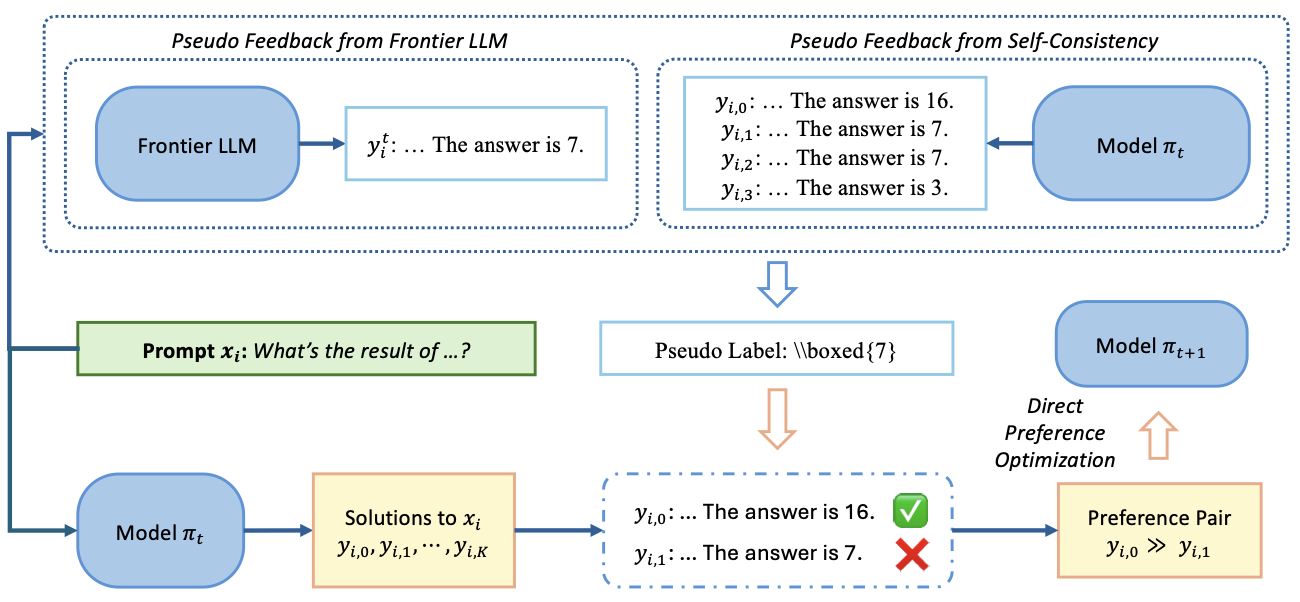 Preference Optimization for Reasoning with Pseudo FeedbackFangkai Jiao, Geyang Guo, Xingxing Zhang, Nancy F. Chen, Shafiq Joty, and Furu WeiIn ICLR (Spotlight) , 2025
Preference Optimization for Reasoning with Pseudo FeedbackFangkai Jiao, Geyang Guo, Xingxing Zhang, Nancy F. Chen, Shafiq Joty, and Furu WeiIn ICLR (Spotlight) , 2025Preference optimization techniques, such as Direct Preference Optimization (DPO), are frequently employed to enhance the reasoning capabilities of large language models (LLMs) in domains like mathematical reasoning and coding, typically following supervised fine-tuning. These methods rely on high-quality labels for reasoning tasks to generate preference pairs; however, the availability of reasoning datasets with human-verified labels is limited. In this study, we introduce a novel approach to generate pseudo feedback for reasoning tasks by framing the labeling of solutions to reason problems as an evaluation against associated test cases. We explore two forms of pseudo feedback based on test cases: one generated by frontier LLMs and the other by extending self-consistency to multi-test-case. We conduct experiments on both mathematical reasoning and coding tasks using pseudo feedback for preference optimization, and observe improvements across both tasks. Specifically, using Mathstral-7B as our base model, we improve MATH results from 58.3 to 68.6, surpassing both NuminaMath-72B and GPT-4-Turbo-1106-preview. In GSM8K and College Math, our scores increase from 85.6 to 90.3 and from 34.3 to 42.3, respectively. Building on Deepseek-coder-7B-v1.5, we achieve a score of 24.6 on LiveCodeBench (from 21.1), surpassing Claude-3-Haiku.
2024
-
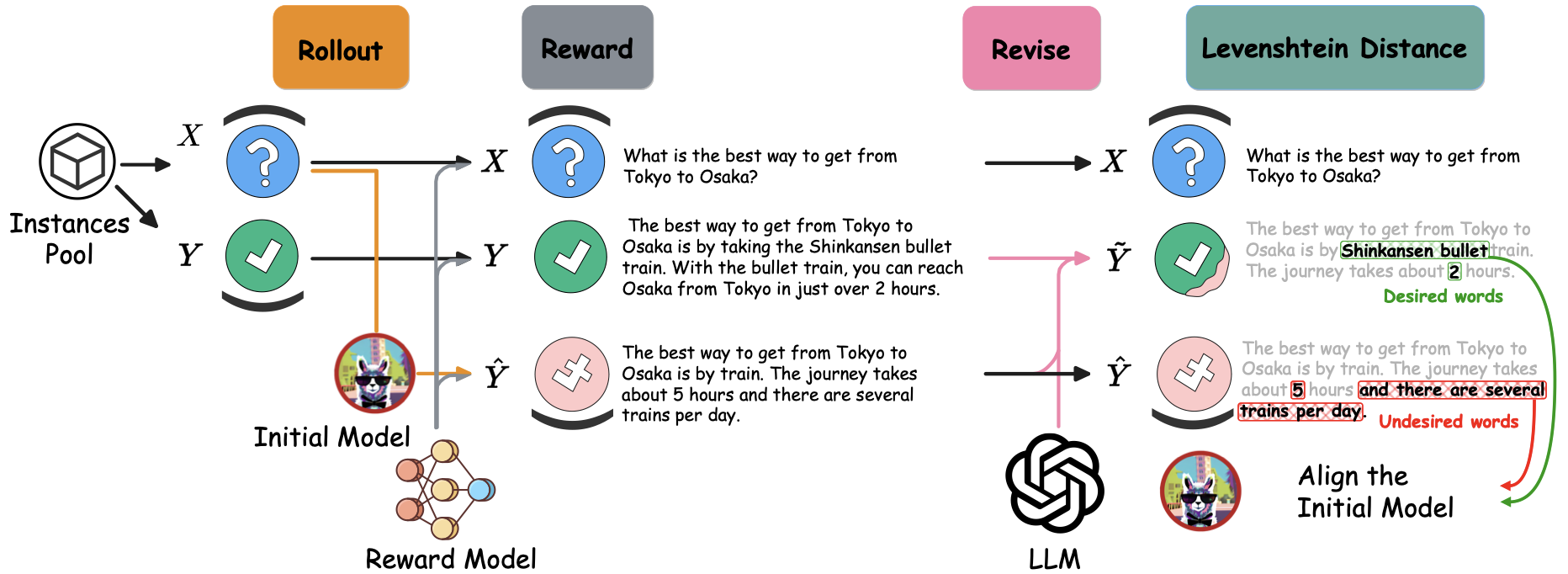 Beyond Imitation: Leveraging Fine-grained Quality Signals for AlignmentGeyang Guo*, Ranchi Zhao*, Tianyi Tang, Xin Zhao, and Ji-Rong WenIn ICLR , 2024
Beyond Imitation: Leveraging Fine-grained Quality Signals for AlignmentGeyang Guo*, Ranchi Zhao*, Tianyi Tang, Xin Zhao, and Ji-Rong WenIn ICLR , 2024Alignment with human preference is a desired property of large language models (LLMs). Currently, the main alignment approach is based on reinforcement learning from human feedback (RLHF). Despite the effectiveness of RLHF, it is intricate to implement and train, thus recent studies explore how to develop alternative alignment approaches based on supervised fine-tuning (SFT). A major limitation of SFT is that it essentially does imitation learning, which cannot fully understand what are the expected behaviors. To address this issue, we propose an improved alignment approach named FIGA. Different from prior methods, we incorporate fine-grained (i.e., token or phrase level) quality signals that are derived by contrasting good and bad responses. Our approach has made two major contributions. Firstly, we curate a refined alignment dataset that pairs initial responses and the corresponding revised ones. Secondly, we devise a new loss function can leverage fine-grained quality signals to instruct the learning of LLMs for alignment. Extensive experiments have demonstrated the effectiveness of our approaches by comparing a number of competitive baselines.
-
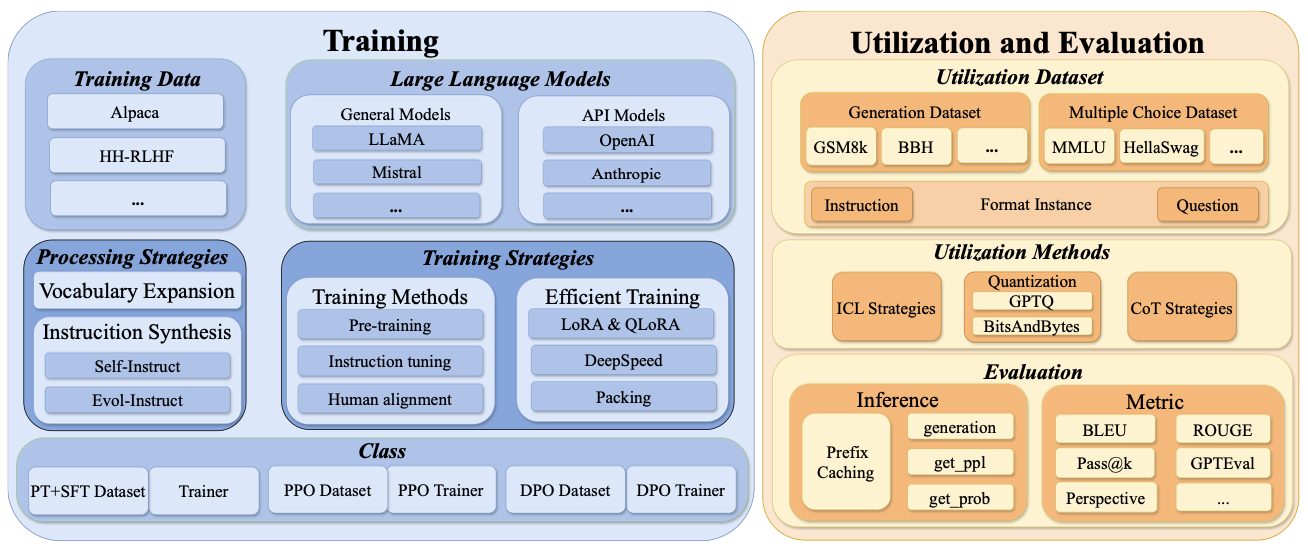 LLMBox: A Comprehensive Library for Large Language ModelsTianyi Tang, Yiwen Hu, Bingqian Li, Wenyang Luo, Zijing Qin, Haoxiang Sun, Jiapeng Wang, Shiyi Xu, Xiaoxue Cheng, Geyang Guo, and othersIn ACL System Demonstrations , 2024
LLMBox: A Comprehensive Library for Large Language ModelsTianyi Tang, Yiwen Hu, Bingqian Li, Wenyang Luo, Zijing Qin, Haoxiang Sun, Jiapeng Wang, Shiyi Xu, Xiaoxue Cheng, Geyang Guo, and othersIn ACL System Demonstrations , 2024To facilitate the research on large language models (LLMs), this paper presents a comprehensive and unified library, LLMBox, to ease the development, use, and evaluation of LLMs. This library is featured with three main merits: (1) a unified data interface that supports the flexible implementation of various training strategies, (2) a comprehensive evaluation that covers extensive tasks, datasets, and models, and (3) more practical consideration, especially on user-friendliness and efficiency. With our library, users can easily reproduce existing methods, train new models, and conduct comprehensive performance comparisons. To rigorously test LLMBox, we conduct extensive experiments in a diverse coverage of evaluation settings, and experimental results demonstrate the effectiveness and efficiency of our library in supporting various implementations related to LLMs.
-
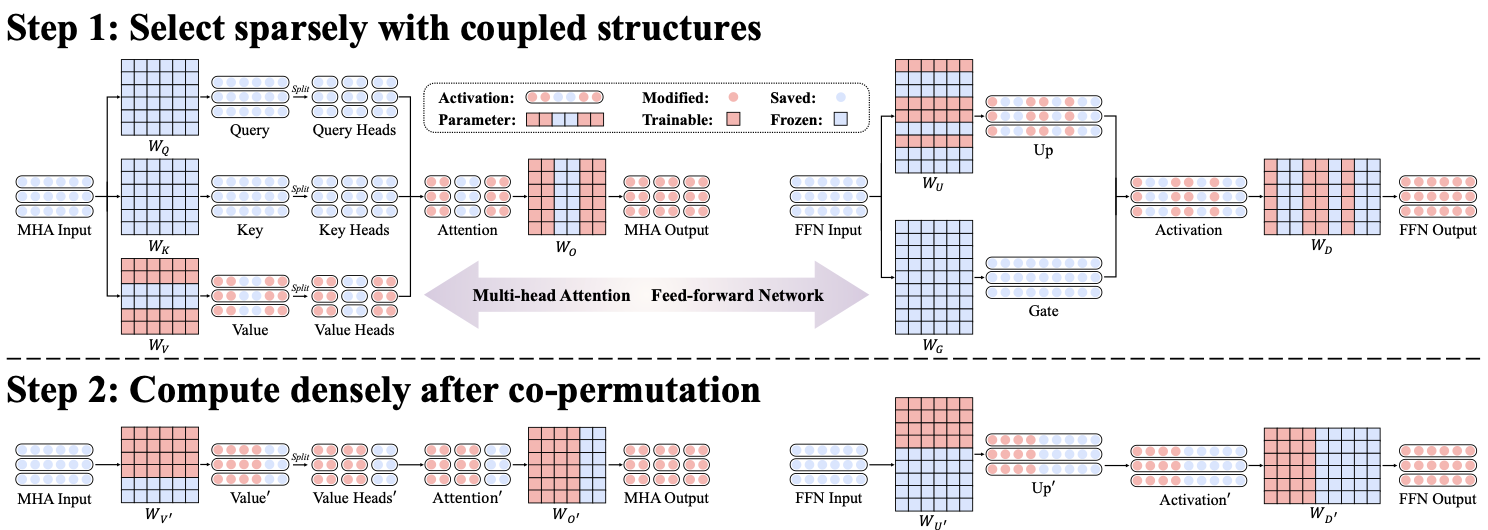 S^2FT: Efficient, Scalable and Generalizable LLM Fine-tuning by Structured SparsityXinyu Yang, Jixuan Leng, Geyang Guo, Jiawei Zhao, Ryumei Nakada, Linjun Zhang, Huaxiu Yao, and Beidi ChenIn NeurIPS , 2024
S^2FT: Efficient, Scalable and Generalizable LLM Fine-tuning by Structured SparsityXinyu Yang, Jixuan Leng, Geyang Guo, Jiawei Zhao, Ryumei Nakada, Linjun Zhang, Huaxiu Yao, and Beidi ChenIn NeurIPS , 2024Current PEFT methods for LLMs can achieve either high quality, efficient training, or scalable serving, but not all three simultaneously. To address this limitation, we investigate sparse fine-tuning and observe a remarkable improvement in generalization ability. Utilizing this key insight, we propose a family of Structured Sparse Fine-Tuning (SFT) methods for LLMs, which concurrently achieve state-of-the-art fine-tuning performance, training efficiency, and inference scalability. SFT accomplishes this by selecting sparsely and computing densely. It selects a few heads and channels in the MHA and FFN modules for each Transformer Block, respectively. Next, it co-permutes weight matrices on both sides of the coupled structures in LLMs to connect the selected components in each layer into a dense submatrix. Finally, \model performs in-place gradient updates on all submatrices. Through theoretical analysis and empirical results, our method prevents overfitting and forgetting, delivers SOTA performance on both commonsense and arithmetic reasoning with 4.6% and 1.3% average improvements compared to LoRA, and outperforms full FT by 11.5% when generalize to various domains after instruction tuning. By integrating our partial back-propagation algorithm, model saves the fine-tuning memory up to 3 and improves the latency by 1.5-2.7 compared to full FT, while delivering an average 10% improvement over LoRA on both metrics. We further demonstrate that SFT can be decoupled into adapters, enabling effective fusion, fast switch, and efficient parallelism for serving multiple fine-tuned models.
2023
-
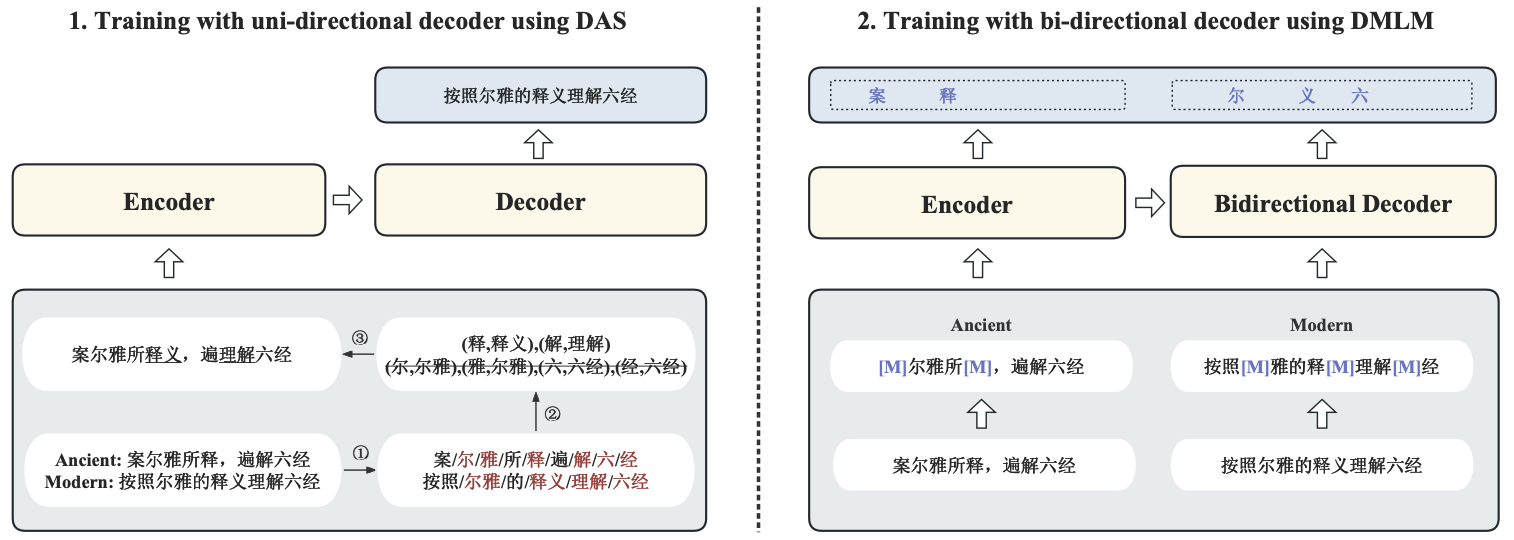 Towards effective ancient chinese translation: Dataset, model, and evaluationGeyang Guo, Jiarong Yang, Fengyuan Lu, Jiaxin Qin, Tianyi Tang, and Wayne Xin ZhaoIn NLPCC , 2023
Towards effective ancient chinese translation: Dataset, model, and evaluationGeyang Guo, Jiarong Yang, Fengyuan Lu, Jiaxin Qin, Tianyi Tang, and Wayne Xin ZhaoIn NLPCC , 2023Interpreting ancient Chinese has been the key to comprehending vast Chinese literature, tradition, and civilization. In this paper, we propose Erya for ancient Chinese translation. From a dataset perspective, we collect, clean, and classify ancient Chinese materials from various sources, forming the most extensive ancient Chinese resource to date. From a model perspective, we devise Erya training method oriented towards ancient Chinese. We design two jointly-working tasks: disyllabic aligned substitution (DAS) and dual masked language model (DMLM). From an evaluation perspective, we build a benchmark to judge ancient Chinese translation quality in different scenarios and evaluate the ancient Chinese translation capacities of various existing models. Our model exhibits remarkable zero-shot performance across five domains, with over +12.0 BLEU against GPT-3.5 models and better human evaluation results than ERNIE Bot. Subsequent fine-tuning further shows the superior transfer capability of Erya model with +6.2 BLEU gain.